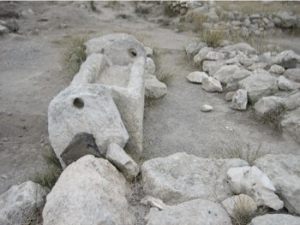Toward the end of the semester in a Writing from Faith course that I regularly teach at my Christian university, a first year student voiced a revelation.

Manger, Meggido, 850 BCE, photo: D. T. Donatus
?Until now,? she told us, ?I?ve always thought, when teachers said ?Be concrete,? that I should use more adjectives. Now I see that it means I need to make people see what I saw and hear what I heard and smell what I smelled. Using your senses to reconstruct an experience helps people believe and care about what you?re saying.?
She was responding to a fellow student?s personal psalm about her fear that, her missionary family being in far off Costa Rica, she wouldn?t get to go home for the holidays. In the poem, the student-psalmist stares at the computer screen while, just beyond the thin walls, her dormmates? are goofing around and chattering about their holiday plans. The poet recounts the family traditions she?ll be missing: getting ornaments out of dusty boxes, drinking hot chocolate with her siblings while Dad reads them all Christmas stories, holding hands to pray over the traditional dinner of arroz con pollo.
We all teared up as she read, and, when she finished, the whole class started scheming about collectively raising the money for her plane ticket. Within minutes of hearing that psalm, they were organizing a new ministry to do the same for every needy MK?as missionary kids are called?on campus.
It was a big moment for me, pedagogically speaking. Not only had one of their writings spurred them to action, but they were finally starting to understand the importance of concreteness instead of just thinking it another feat of dubious value that their teachers and now I demanded of them in lieu of explaining. The power of sensory data to persuade was a creative strategy I?d been trying to convince them all of from day one. I lectured about it, pointed out concreteness in whatever we were reading, and highlighted in yellow and commended instances of concreteness in their own writing. It?s a simple concept, but somehow even advanced creative writing students struggle to grasp it.
?But it?s so easy,? I coaxed. ?All you have to do is appeal to our senses!?

Jesus, St. Martin-in-the-Fields, photo: R. Croft
Christmas is such a sensory holiday. Carols. Pine smells. Fruitcakes and sugar cookies. Snow. The sheer concreteness of Christmas crystallizes the joy-inspiring gospel it celebrates: that our invisible Creator sent us concrete evidence, in the form of his newborn Son, so that we might believe and have eternal life.If we can get, in our minds, to that baby in that feed-trough out in that barn?if we can really believe that good news?we have accomplished what Jesus will later say is the only work of God expected of us: to believe in the one he has sent.
Like this:
Be the first to like this.
Source: http://wordservewatercooler.com/2012/12/24/concreteness-and-the-gospel-of-christmas/
ann romney marco rubio marco rubio farrah abraham Paul Ryan Speech chris cooley chris cooley
কোন মন্তব্য নেই:
একটি মন্তব্য পোস্ট করুন